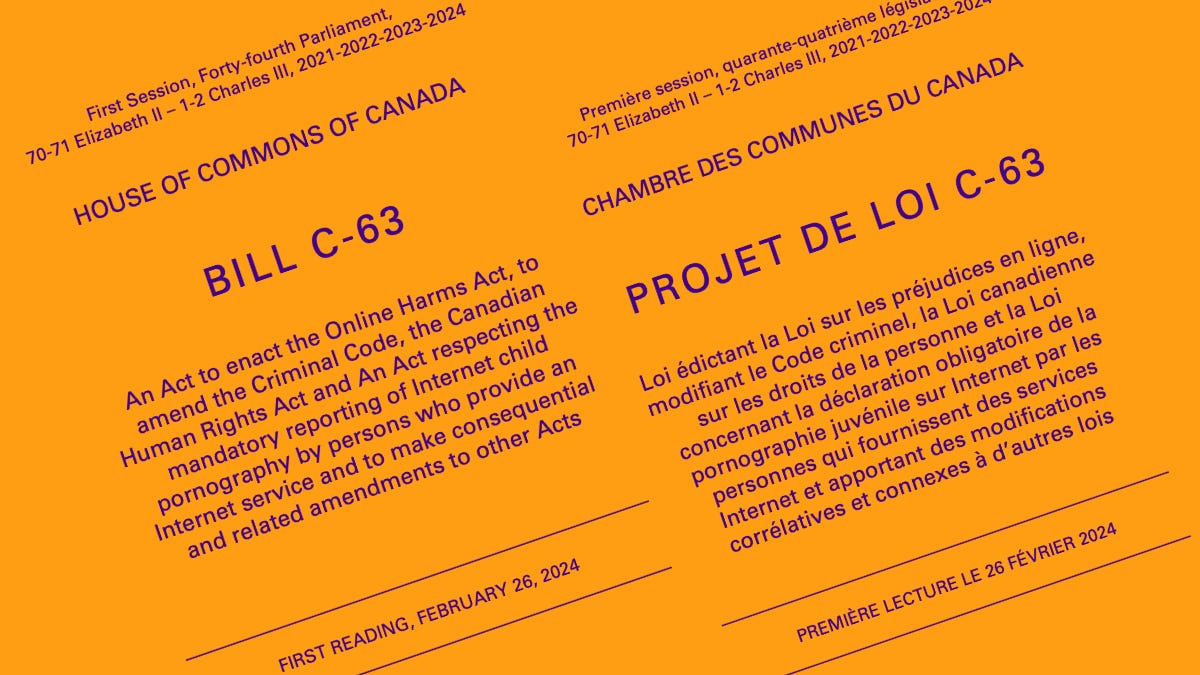TRUDEAU'S ONLINE HARMS ACT (BILL C63) THREATENS CIVIL RIGHTS IN CANADA
By John Wilson
On February 26th, the federal government tabled Bill C63 (also known as the Online Harms Act) in parliament. At 100 pages, this verbose, imprecise proposed legislation has so far not resulted in much general public discussion, but it should. All of us who support freedom of speech and other democratic rights should be urgently concerned about the dangerous threats this bill contains. This Bill comes from the same government that imposed the Emergencies Act to deal with the illegal occupation of downtown Ottawa by the so-called Freedom Convoy, to cover up the almost total inaction of state agencies (very much including the Ottawa police, the federal government and the Ontario provincial regime), on this issue.
Several critics of C63 have pointed out that the offences cited in the bill are already dealt with by existing law; it's not that they are legal now. If existing laws are not adequate, they can be changed. Mostly, though, these existing laws historically have rarely, if ever, been enforced. So why the big emergency? Another con job!
Probably the most dangerous item in the bill is the creation of a new regulator, the Digital Safety Commission. Here's what the executive director of the Canadian Civil Liberties Association has to say about it. "One troubling aspect of Bill C63 is the vast authority bestowed on a newly established body, comprised of government appointees, to interpret the law, make up new rules, enforce them and then serve as judge, jury and executioner. Granting such sweeping powers to one body undermines the fundamental principle of democratic accountability. Furthermore, the bill's provisions, which include sweeping new search powers with no warrant requirement, poses significant threats to privacy rights. The bill provides for unacceptable intrusions into individuals' digital lives."
Margaret Atwood, arguably Canada's most prominent author, calls the bill "Orwellian." In 1984, Orwell's best known book, a future totalitarian state which uses surveillance on citizens even in their own homes, the "Ministry of Truth" erases facts and history in order to bolster the regime of "Big Brother".
So far, we have heard little on this bill from the NDP and the labour movement, both of which should have denounced it when it was first presented. Two main reasons: the complaint process and the prevention of "future crime". Anyone (even non-citizens and non-residents) can make a complaint to the Canadian Human Rights Commission. It is not a judicial body, so the evidence required to make a decision will be lower than in a court; the same is true of the Digital Safety Commission. The evidence then is not "beyond a reasonable doubt" but on "reasonable grounds" (whatever that means). If you are an accused, you do not have the same rights you have in a court. Moreover, hearings can be held in secret. And you don't have the right to face your accuser or even know who they are. Orwellian indeed. Complainants have the right to be compensated for costs; the accused does not. As well, those 'convicted' may have to pay the complainant $20,000. Costs to the accused may run into thousands of dollars for legal representation, not eligible for compensation, even if the complaint is dismissed. So even if the accused is not found guilty, the process is the punishment. Many bill critics have pointed out that this is an incentive (money and revenge) to make a complaint, and that there will be a tsunami of complaints to an agency that already has a huge backlog.
And now to the prevention of "future" crime. If a complainant "fears on reasonable grounds" that another person will commit a hate crime, a judge may order their imprisonment, or subject them to house arrest and require that they wear an electronic monitoring bracelet. This is obscene. Unbelievable. Even with all the Harperites on the Supreme Court, it is hard to see it not scrapping this provision.
Harmful content is defined as content that promotes violence, that incites violent extremism or terrorism, that sexually victimizes a child, is used to bully a child, that induces a child to harm themselves, or intimate content communicated without consent. Most people likely would agree with that, but here is more that the executive director of CCLA says:
"Bill C63 risks censoring a range of expression from journalistic reporting to healthy conversations among youth under 18 about their own sexuality and relationships. The broad criminal prohibitions in the bill risk stifling public discourse and criminalizing political activism."
This should be sufficient to show that this legislation is a can of worms. We should all oppose it and demand that the NDP, the labour movement, and community activist groups also oppose it. Let's get to work on that!


